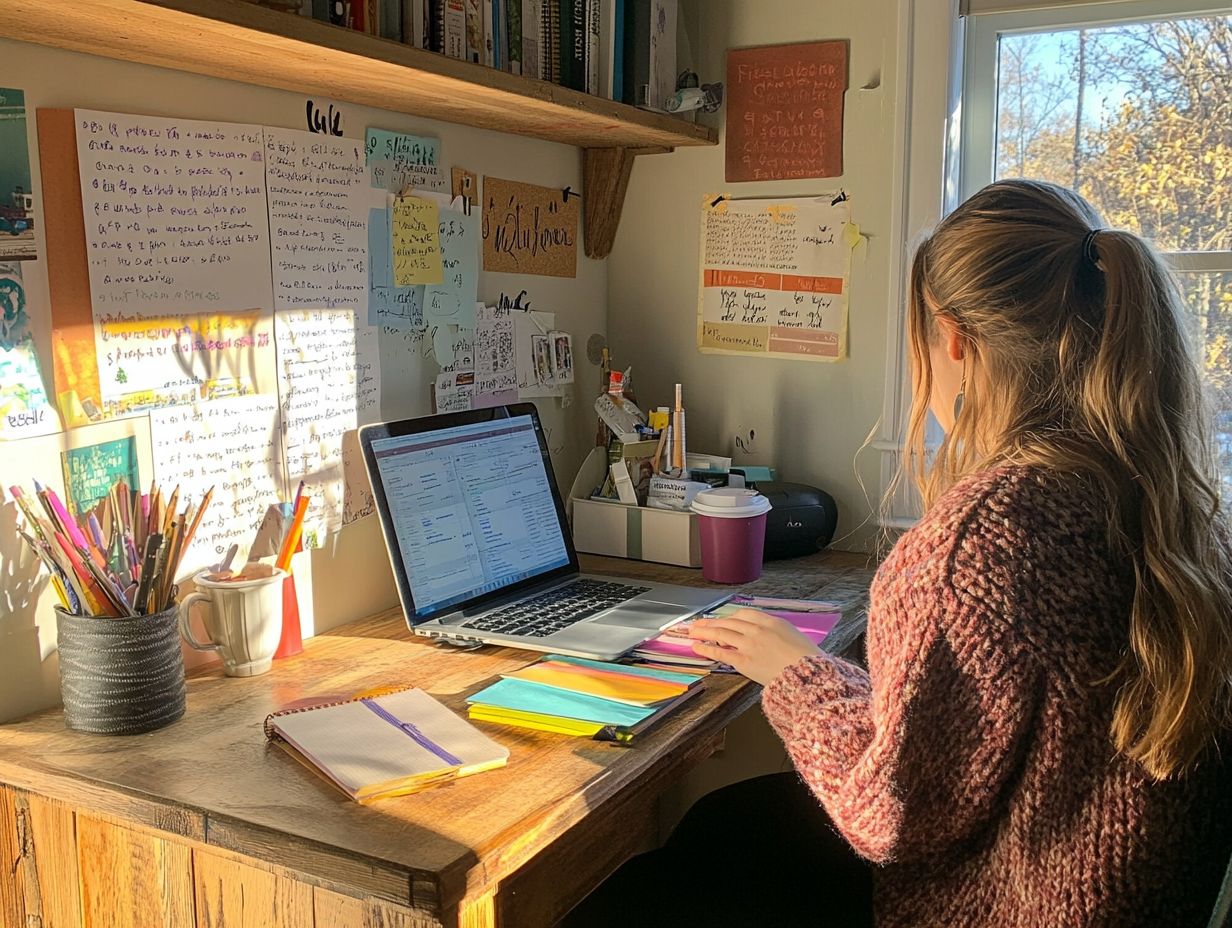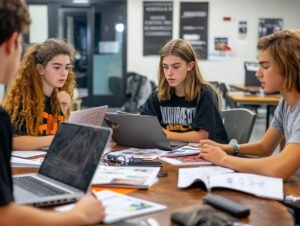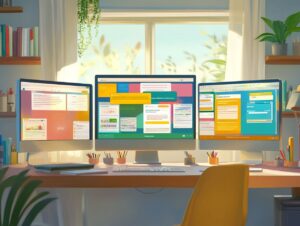Effective study techniques can significantly impact the mastery of new material. This article examines a range of strategies that enhance learning, including active learning methods that engage the mind, as well as organization and time management tips that help maintain focus and productivity.
Additionally, it addresses memory techniques that improve retention, outlines how to create an optimal study environment, and presents subject-specific strategies tailored to various disciplines.
By exploring these approaches, individuals can transform their study habits and pave the way for academic success.
What Makes a Study Technique Effective?

Effective studying is defined by the capacity to optimize learning outcomes through the deliberate application of various study techniques. By comprehending the principles of cognitive load, goal setting, and self-assessment, students can formulate personalized learning strategies that enhance their academic performance.
Techniques such as spaced repetition, active learning, and retrieval practice are integral to this process, enabling students to identify their individual learning styles and adapt their methodologies accordingly. Effective studying encompasses not only the methods employed but also the mindset and motivation necessary for continuous improvement and academic success.
To fully leverage these competencies, individuals should evaluate how their study environment and habits influence their focus and retention.
- For example, maintaining a dedicated study space that is free from distractions can substantially reduce cognitive load, thereby facilitating improved concentration.
- Establishing specific and attainable study goals can provide clearer direction and foster a sense of accomplishment upon achievement.
- Additionally, seeking feedback through self-assessment is crucial, as it allows students to identify their strengths and weaknesses, thereby paving the way for targeted improvements.
By integrating these elements, individuals not only promote better learning outcomes but also cultivate a deeper sense of agency in their educational journey.
Active Learning Strategies
Active learning strategies aim to engage learners in their educational processes, promoting participation and collaboration to enhance comprehension and retention.
Techniques such as teaching others, peer collaboration, and problem-solving facilitate deeper understanding and the cultivation of critical thinking skills.
By incorporating diverse forms of active learning, including discussion, brainstorming, and practice testing, students are more likely to engage with the material, leading to improved academic performance and learning outcomes.
This approach not only enhances the enjoyment of studying but also fosters a positive study environment that is conducive to effective learning.
Examples and Benefits
There are numerous examples of active learning strategies that can effectively enhance student engagement and productivity, particularly within study groups. Techniques such as collaborative problem-solving, discussions, and interactive activities enable students to share insights and deepen their understanding of complex concepts.
For instance, implementing role-playing scenarios in a study group can encourage participants to adopt diverse perspectives, thereby fostering critical thinking and empathy.
Additionally, the use of concept mapping not only organizes information visually but also reinforces connections between ideas, ultimately improving memory recall.
When students engage actively in teaching one another, they reinforce their own knowledge while simultaneously boosting their confidence. This reciprocal relationship creates a dynamic learning environment that is conducive to academic success.
By adopting these strategies, students can cultivate a collaborative atmosphere where every member feels enableed to contribute, resulting in increased productivity and a more enriching educational experience.
Organization and Time Management Techniques
Effective time management and organizational skills are essential for achieving academic success, as they allow students to develop a structured study schedule that optimizes productivity.
By employing techniques such as time blocking and goal tracking, students can prioritize their tasks, manage their cognitive load, and ensure consistent progress toward their learning objectives.
Crafting a personalized study schedule that includes regular study breaks and revision strategies not only enhances focus but also helps sustain motivation throughout the academic journey.
Furthermore, utilizing digital tools and applications can facilitate the organization process and enhance student accountability.
Tools and Tips for Staying Organized and Managing Time

Utilizing tools and strategies for maintaining organization and managing time can significantly enhance a student’s ability to focus and retain information.
In the contemporary, fast-paced educational environment, the use of specific applications and platforms is essential for achieving academic success. For instance, note-taking applications such as Notion and Evernote enable students to categorize and access their study materials in an organized manner, thereby reducing clutter and promoting efficiency.
Similarly, task management tools like Trello and Todoist assist in breaking down larger assignments into manageable tasks, facilitating the timely completion of deadlines while maintaining a balanced workload.
Incorporating techniques such as time blocking—where students allocate specific time slots for different subjects or tasks—can further enhance focus and organization.
Ultimately, the strategic deployment of these digital tools, combined with effective focus strategies, can transform the learning experience and foster a more productive study routine.
Memory Techniques
Memory techniques play a crucial role in enhancing the retention and recall of information, thereby enabling students to excel in their academic endeavors.
Methods such as spaced repetition, mnemonic devices, and visualization strategies can substantially improve memory retention by making the learning process more effective and engaging.
By utilizing cognitive strategies that align with individual learning styles, students can establish meaningful connections with the material, resulting in improved comprehension and long-term retention of knowledge.
Additionally, the incorporation of regular self-assessment practices can aid in monitoring progress and reinforcing understanding.
Methods for Improving Memory Retention
To enhance memory retention, students may implement several effective strategies that minimize cognitive load and foster a better understanding of the material.
Techniques such as retrieval practice, which involves the active recall of information, have been demonstrated to significantly improve memory retention. Additionally, emotional regulation is crucial in memory formation, as positive emotions can strengthen connections with the material. By incorporating these strategies into their study routines, students can establish a solid foundation for effective learning and improved academic performance.
These methods not only streamline the learning process but also cultivate an engaging environment where information can be processed more efficiently.
For instance, when students participate in retrieval practice, they do not merely rely on their initial comprehension; instead, they reinforce and deepen their knowledge through active involvement.
Furthermore, mastering emotional regulation enables learners to address anxiety and stress, which often impede their ability to concentrate and retain information. By deliberately associating study material with positive emotions, students can enhance their recall abilities, rendering study sessions both more productive and enjoyable.
Study Environment and Habits
The study environment is instrumental in cultivating effective study habits, as a distraction-free setting can greatly enhance focus and concentration.
Establishing an optimal study environment requires careful consideration of various factors, including lighting, noise levels, and comfort, all of which contribute to a supportive atmosphere for learning.
Furthermore, fostering healthy study habits—such as incorporating regular study breaks and prioritizing mental well-being—can mitigate the risk of burnout and enhance overall productivity.
By acknowledging the influence of the study environment on learning outcomes, students can implement necessary adjustments to optimize their academic performance.
Creating an Optimal Study Environment and Developing Good Habits

To create an optimal study environment, it is imperative to establish a distraction-free space that promotes focus and motivation.
Developing effective study habits entails creating consistent study routines and employing concentration techniques that facilitate sustained attention over extended periods.
This involves identifying a quiet area where interruptions are minimized and utilizing tools such as timers or the Pomodoro technique to segment study sessions into manageable intervals.
Students should also consider decluttering their workspace and ensuring that all necessary supplies are readily accessible to enhance efficiency.
Additionally, incorporating background music or ambient sounds may aid concentration, depending on individual preferences.
Ultimately, maintaining a positive mindset and regularly reminding oneself of their end goals can significantly enhance motivation. Consequently, these strategies are not merely beneficial but essential for achieving academic success.
Tips for Studying Specific Subjects
Studying specific subjects necessitates the development of tailored strategies that align with the distinct requirements of the material, thereby facilitating enhanced comprehension and retention.
A grasp of educational psychology can assist students in identifying effective learning strategies that cater to their individual needs, regardless of whether they are engaged in the study of mathematics, science, or language arts.
Furthermore, the utilization of subject-specific resources, such as academic databases and online platforms, can offer valuable insights and support.
By implementing targeted strategies and leveraging appropriate resources, students can optimize their study efforts and attain improved academic outcomes.
Subject-Specific Strategies and Resources
The implementation of subject-specific strategies and resources can significantly enhance a student’s ability to master content and achieve their learning objectives.
When learners engage with specialized resources—such as practice examinations, educational videos, and interactive quizzes—they not only gain exposure to various explanations and perspectives but also reinforce their understanding of challenging material.
For example, the use of flashcards for vocabulary retention or concept maps for visual learners can greatly assist in organizing thoughts and information.
Revision strategies, such as spaced repetition, contribute to the consolidation of knowledge over time, while peer study groups facilitate the sharing of insights and the clarification of complex topics.
These techniques create an environment that is conducive to deeper learning and consistent academic improvement.
Frequently Asked Questions
What are the best study techniques for optimal learning?

The best study techniques for optimal learning include creating a study schedule, taking breaks, reviewing notes regularly, practicing active learning, and using mnemonic devices.
What is the most effective way to study for exams?
The most effective way to study for exams is to start studying early, break up study sessions into manageable chunks, use active learning techniques, and practice with past exams or review materials.
How can I improve my focus and concentration while studying?
To improve focus and concentration while studying, try studying in a quiet, distraction-free environment, minimizing multitasking, and using techniques like the Pomodoro method to break up study sessions.
Are there any study techniques that can help with memorization?
Yes, there are several study techniques that can help with memorization, such as using mnemonic devices, creating flashcards, and using spaced repetition.
What are some tips for staying motivated while studying?
To stay motivated while studying, try setting realistic goals, rewarding yourself after completing tasks, and finding a study buddy or group for accountability and support.
Can I use technology as a study technique?
Yes, technology can be a helpful study technique. Some examples include using online flashcards or study apps, recording and listening to lectures, and creating digital study guides.




